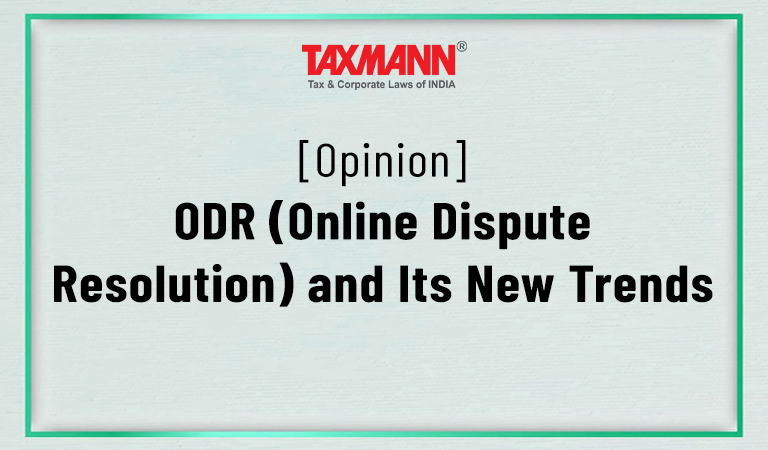[Opinion] ODR (Online Dispute Resolution) and Its New Trends
- Blog|News|Company Law|
- 3 Min Read
- By Taxmann
- |
- Last Updated on 29 November, 2022

[2022] 145 taxmann.com 110 (Article)
Abstract
Globalization has been and is a great driving force in the process of economic and social integration of countries around the world. It has been a great tool for breaking down economic barriers and treating the world as a trading market. In modern commercial dispute resolution techniques, the focus has shifted from litigation to arbitration. Since things are never static, the focus shifts more from arbitration to alternative dispute resolution procedures. Online dispute resolution in India is an important part of the legal activation of ICT systems in India and the regulatory framework of the information society in India. Online Dispute Resolution (ODR) in India is in its infancy and it is becoming important day by day. With the enactment of the Information Technology Act of 2000 in India, e-commerce and e-governance received official and legal recognition in India. Even India’s Traditional Arbitration Act has been reformed and now India has introduced the Arbitration and Conciliation Act, 1996 which meets the harmonized standards of the UNCITRAL model. Even the Civil Procedure Code of 1908 was amended and Section 89 was introduced to provide Alternative Dispute Resolution (ADR) methods in India. The objective of this article is to analyze the future use of ODR in India. A similar need has arisen due to the increasing use of alternative dispute resolution mechanisms in India, which will ease the burden on the already overburdened courts in India. The concept of Online Dispute Resolution (ODR) has emerged in various jurisdictions due to globalization and the success of ADR. The many benefits of ADR include less time, faster, less expensive, and more convenience. These advantages are what make it more lucrative than traditional methods like litigation. Due to the lack of adequate e-commerce laws, cumbersome and overwhelming court procedures in the courts in India, ODR is a more convenient way to handle e-commerce related disputes in India. India, including consumer complaints.
Introduction
Online dispute resolution (ODR) is a branch of dispute resolution which uses technology to facilitate the resolution of disputes between parties. It primarily involves negotiation, mediation or arbitration, or a combination of all three. Online dispute resolution (“ODR”) is conceived as a means to achieve some of the most powerful legal ideals of the Western legal tradition, which include:
- Legal Certainty: In making individual plans, decisions, and choices everyone is entitled to know what the law is in advance.
- Access to Justice: Everyone involved in a dispute shall be entitled to an easily accessible redress mechanism that provides for a timely resolution and effective remedies at a reasonable cost.
Objectives of the study
The study has the following objectives:—
- To know the evolution and origin of online dispute-resolution mechanisms
- To trace out the evolution towards Online Dispute Resolution Mechanism: Prospects and Challenges in India.
- To analyse the international perspective of ODR mechanisms.
What is online dispute resolution: ODR was developed in the private sector to facilitate the quick resolution of conflicts to the satisfaction of both parties. Because of its utility in quickly resolving lower-value, high-volume cases, ODR has begun to spread from the private sector to public courts. Although courts around the country have adopted a range of online tools, the NCSC, which focuses on improving judicial administration around the world, considers a platform to be “court ODR” only if it is:
- Court-annexed: Hosted or supported by the judicial branch.
- Public-facing: Available for litigants to resolve disputes, rather than as an internal tool for court staff.
- A digital space: Online resources that can manage a case from start to finish and never require users to go into a courthouse.
Click Here To Read The Full Article
Disclaimer: The content/information published on the website is only for general information of the user and shall not be construed as legal advice. While the Taxmann has exercised reasonable efforts to ensure the veracity of information/content published, Taxmann shall be under no liability in any manner whatsoever for incorrect information, if any.

Taxmann Publications has a dedicated in-house Research & Editorial Team. This team consists of a team of Chartered Accountants, Company Secretaries, and Lawyers. This team works under the guidance and supervision of editor-in-chief Mr Rakesh Bhargava.
The Research and Editorial Team is responsible for developing reliable and accurate content for the readers. The team follows the six-sigma approach to achieve the benchmark of zero error in its publications and research platforms. The team ensures that the following publication guidelines are thoroughly followed while developing the content:
- The statutory material is obtained only from the authorized and reliable sources
- All the latest developments in the judicial and legislative fields are covered
- Prepare the analytical write-ups on current, controversial, and important issues to help the readers to understand the concept and its implications
- Every content published by Taxmann is complete, accurate and lucid
- All evidence-based statements are supported with proper reference to Section, Circular No., Notification No. or citations
- The golden rules of grammar, style and consistency are thoroughly followed
- Font and size that’s easy to read and remain consistent across all imprint and digital publications are applied



 CA | CS | CMA
CA | CS | CMA
